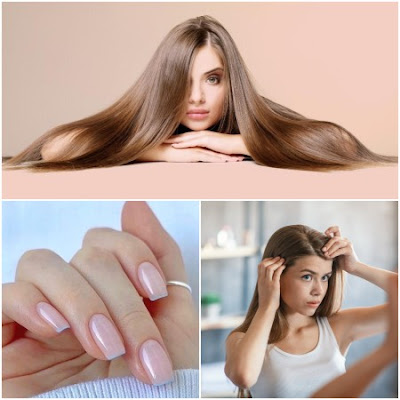Does your
hair feel weak and easily damaged? It is
a bewildering paradox that many people encounter but few understand.
Let's explore the causes of this phenomenon, looking at the some elements that lead to both strong and weak hair, as well as solutions for each.
Why do i have strong nails but weak hair?
1. Genetics and Composition
The strength
and quality of our hair and nails are mostly determined by our genetics. The
way that each person's body makes keratin the protein that gives their hair and
nails their strength depends on their genetic composition.
Some people
may be born with longer, more durable nails
due to their genes, but they may also be born with weaker hair strands. This
incompatible trait of having strong nails but weak hair can be explained by
this genetic predisposition.
2. Environmental Factors
Our hair can
suffer greatly from external factors like exposure to strong chemicals, overuse
of heat styling, and pollution from the environment. These factors have the
potential to deplete the hair of its natural oils, resulting in breakage, dryness,
and general weakness.
Yet, nails
are frequently protected from these types of environmental stressors. They
appear to be more resilient and sturdy because they are not as exposed to heat,
chemicals, and pollutants as our hair is.
3. Nutritional Imbalance
Our diet has
a major effect on the strength of our hair and nails. Nutritional problems,
including insufficient consumption of protein, vitamins, and minerals, can have
an effect on the condition of the hair and nails.
A person may
have strong nails as a result of eating a diet high in biotin and calcium, but
lacking in other nutrients like vitamin E, iron, and omega-3 fatty acids that
are necessary for keeping healthy hair.
Read: How
Can I Improve My Weak Hair?
4. Hydration and Moisture
Sustaining
the elasticity and strength of hair and nails requires proper hydration. Dry,
brittle hair and brittle nails can result from dehydration.
While the
surrounding tissues provide moisture to nails, hair frequently finds it
difficult to hold onto moisture, particularly in dry climates. The apparent
strength of nails as opposed to the weakness of hair may be attributed to this
difference in moisture retention.
5. Hair and Nail Care Practices
The strength
and health of our hair and nails can also be greatly impacted by how we take
care of them. Indeed, using acetone-based products or nail polish remover
frequently can weaken nails over time. Overwashing and heat styling can also
strip hair of its natural oils and cause breakage.
Applying
nourishing treatments like hair masks and nail oils, limiting the use of heat
styling, and using sulfate-free shampoos
are examples of gentle care routines that can help shield hair and nails from
harm and encourage adaptation.
6. Hormonal Changes and Medical
Conditions
Changes in
hormones during puberty, pregnancy, or menopause can have an impact on the
strength and condition of hair and nails. Weak hair and brittle nails can also
be signs of conditions like hypothyroidism or hormonal imbalances.
It is essential
to see a doctor to address any underlying medical conditions or hormonal issues
in order to manage and strengthen hair and nails.
Final Note
A combination of genetic predisposition, environmental factors, nutritional imbalances, and hydration levels must be taken into consideration in order to understand why we might have strong nails but weak hair. We can proactively address these factors by being aware of them.
The general health and strength of both hair and nails can be enhanced by maintaining a nutritious diet full of vital nutrients, limiting exposure to harsh chemicals, drinking plenty of water, and adopting good hair care practices.
To achieve healthy hair and nails, keep in understanding that there are many different aspects of our lifestyle and surroundings that need to be taken into consideration.

